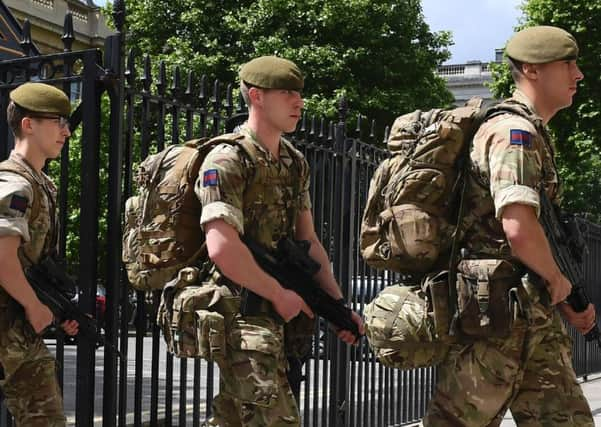SNP’s ‘soldiers’ union’ plan works fine for us, say Danes


Writing for Scotland on Sunday, the head of the Central Association for Permanent Military Personnel in Denmark said the union, which takes part in collective pay negotiation and speaks up on welfare issues, is respected by military and government leaders.
The SNP has called for military personnel to be given a representative body to negotiate on their behalf, acting as a union but without the right to strike.
Advertisement
Hide AdAdvertisement
Hide AdLabour has now joined the nationalists in calling for troops to be given representation in order to call for better pay, housing and conditions.
Figures from the House of Commons Library have shown that the starting salary for an army private is now £1,159 lower in real terms than in 2010.
And despite the Ministry of Defence (MoD) spending £135m on refurbishing 3,800 housing units for troops and their families, a Public Accounts Committee report last week found that satisfaction with housing has only risen slightly.
Jesper Korsgaard Hansen, who chairs the military personnel association known by its Danish initials CS, said that guaranteed “serious and equal” talks with government that produce “significant results” in terms of welfare.
And he said concerns about a union for troops undermining the cohesion of military troops and breaking down the chain of command had not come to pass.
“The CS representative’s rank, whether they’re a private or a sergeant, is not important,” Korsgaard Hansen writes. “The crucial thing is the trust, support and recognition they have among the members – and that they are acknowledged and respected by the manager, who at the same time sees the representative as his direct connection to his employees.”
SNP MP Martin Docherty-Hughes, who sits on the Commons Defence Select Committee and has put forward legislation to create an armed forces representative body, said concerns about pay and conditions would be “hard to ignore” if the government had to negotiate with a union.
“After an Armed Forces Week which made clear how much goodwill there is for those who serve, it is still incredible that on the simplest matters of pay and conditions they lag well behind other public servants, and indeed the militaries of other comparable countries,” Docherty-Hughes said.
Advertisement
Hide AdAdvertisement
Hide Ad“Since introducing my Private Member’s Bill last year, it has become increasingly obvious that there is a lot of institutional inertia with regards to treating serving armed forces personnel like any other employee or public servant.
“I have no doubt that if the 135,000 members of the armed forces were able to speak with one strong voice, we would find very quickly that any government would find it hard to ignore them.”
Unveiling Labour’s plans to create an Armed Forces Federation last week, Jeremy Corbyn said that “after nearly a decade of cuts and privatisation our forces and their families are paying the price. A body that stands up for their interests will ensure they are treated with respect”.
Responding to Labour’s call, the Ministry of Defence said it is “committed to ensuring that our military personnel are rewarded for their service to this country”, and had recently confirmed that the lowest-paid staff would get a living wage.